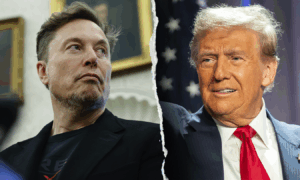On November 5, 2024, President Joe Biden’s attempt at greatness in history was thwarted. If either Biden or Vice President Kamala Harris had been elected president and served a second consecutive term for the Democrats, history would likely remember him as the hero who brought America back to normalcy following the chaos of Trump’s first term, who recovered the country from the COVID-19 pandemic, who restored American leadership after a period of retreat, and who rebuilt democracy following the assault on January 6, 2021.
Instead, Biden will likely be remembered as a placeholder who was well-intentioned but only somewhat effective. His limited term and personal limitations meant that many of his proud accomplishments would undoubtedly be undone by the man he thought he had banished from power, despite his best efforts.
After the disastrous debate in June 2024, which ended his reelection attempt, it became apparent that he was getting older and less energetic. However, it wasn’t the only issue. It all came down to Biden’s habit of underestimating the gravity of a situation and failing to provide comprehensive solutions: he recognized the need to boost the economy following the pandemic, but he ignored the dangers of inflation; he rushed to the aid of Ukraine and Israel, but he failed to foresee how those conflicts would develop; and he was certain that Trump posed a threat to democracy, but he did nothing to strengthen democratic safeguards. Biden, who has never been one to stand out, may have been a great president during a calmer period. The present situation, however, required a Roosevelt, and he was only a Biden.
After the terrifying four-year speedboat ride, many Americans breathed a sigh of relief in the early years of Biden’s administration in 2021. Biden began to see himself, and rightfully so, as the rescuer of democracy after his triumph. He squandered and even bought into the exaggerated analogies between his program and the New Deal, seizing opportunities to “go big” as the nation shrugged aside the pandemic. He elevated the inflated notion that his presidency was a watershed moment in world history above that of any previous president.
Pundits in 2021, swept up in the post-Trump euphoria, joined White House flacks in praising the new president, who they imagined to be far more imaginative than his Democratic predecessors. The phrase that Biden was transforming into a “transformational president” was repeated by television commentators. Some people ridiculously said he was the best American leader since FDR.
The American Rescue Plan, a massive spending package meant to speed up the recovery from the recession caused by the epidemic, was the source of all these illusions. The law’s fast immunization program, in addition to its stimulus expenditure, contributed to the restoration of safe social contact. Despite its merits, the plan paled in comparison to the myriad of comprehensive changes enacted by Franklin D. Roosevelt in his first 100 days in office and by Lyndon B. Johnson in the shape of his Great Society. Bill Clinton and Barack Obama also approved first-year economic plans that were at least as substantial as Biden’s. Unemployment benefits expansion, the Earned Income Tax Credit, and the Child Tax Credit were all programs that Biden inherited from Clinton and Obama. While Obama was the first to adopt the term and follow the notion of “middle out” economics, Biden falsely claimed that he was the one who originally came up with the idea.
No matter how good it was, the American Rescue Plan would never have been able to achieve the revolutionary results that its advocates had hoped for. Trump had already signed the CARES Act, another massive relief and stimulus package, the year prior, during the height of the COVID-19 pandemic. The worst economic downturn in U.S. history had ended by the time Biden became president, the Covid recession.
More funding for manufacturing, infrastructure, and renewable energy was authorized by three more significant measures that Biden signed later in his administration. If he had been reelected, this record may have made his presidency’s generally robust economy the focus of his legacy, erasing the memory of the severe inflation of the first two years. But his budget plans caused the greatest inflation rate since Jimmy Carter’s presidency and made him and his administration liable for more than anybody else. Inflation crippled Harris’ attempt to succeed him and strengthen his legacy even after it receded. Now that much of the budget has remained unspent, Trump may veto some of his planned domestic achievements, including his landmark legislation promoting renewable energy.
Similarly, Biden’s foreign policy record—which was taking shape as his crowning achievement—is in jeopardy of being undone by Trump’s return. His disastrous retreat from Afghanistan had devastated the country, but his passionate backing for Israel and Ukraine was about to prove his liberal internationalism was right and win over younger Democrats and Americans. Nevertheless, Biden overplayed his hand in both instances, putting this legacy at risk as well.
There was no arrogance in Biden’s muscular internationalism. Even though he was deeply committed to Israel and Ukraine, Biden never deployed American forces to Gaza or the Donbas, as have other Democratic presidents since Vietnam (and particularly Iraq). Similarly, he wanted the troops out of the peacekeeping mission in Afghanistan as soon as possible. By approving the Doha Accord with the Taliban in 2020, which established a departure schedule and conditions, Trump had effectively trapped his successor. Still, such limitations did not appear to bother Biden. As vice president in 2009, Biden had lost a heated internal debate on temporarily increasing our troop commitment in Afghanistan. Even though the number of American casualties in battle has dropped significantly since 2014, he was determined to end the 20-year mission once he became president.
Unfortunately, the summer 2021 withdrawal was ill-planned, poorly conducted, and hasty; after all, why not retain Bagram Air Base? The government even acknowledged this. Inflation began to bite that summer as well, casting doubt on the White House’s boasts of unparalleled competence and professionalism.
To move on from the Afghanistan disaster, Biden sought to unite the nation and the West in support of Ukraine’s defense against Russia’s invasion in 2022. Prior to Trump’s cozy relationship with Putin, Obama had minimized Russia’s danger and given Moscow leading responsibilities in resolving the Syrian civil war. At Biden’s inauguration in 2021, the readiness and desire of the United States to lead the globe remained uncertain.
Biden performed admirably. He strengthened NATO by including Sweden and Finland into the organization. In doing so, he reaffirmed the concept of national sovereignty and rallied Europe to defend not only Ukraine but the whole post-WWII international system. “Putin thought he’d take Kyiv in three days,” Biden boasted at last August’s Democratic convention. Even after all these time, Ukraine remains a free nation. Similarly, while Biden’s support for Israel in its regional conflicts was inconsistent at times, it did help pave the way for a more peaceful Middle East in the medium to long term, wherein the Islamic Republic of Iran, Hezbollah, and Hamas are no longer a threat.
Many have praised Biden’s performance in Ukraine as his best hour, despite the fact that opinions on his Israel policy remain deeply split. Yet again, that decision might be overturned if he is unable to crown a successor who shares his views. What seemed like courageous visionary thinking is now more like a cautious Goldilocks approach, at least to some. Biden did not authorize the use of American armaments against Russian targets by Ukraine until November 2023. This delay may have caused the conflict to go on for too long, preventing an internationalist American president from securing the conditions of its resolution. Although Trump might not provide Putin the conquest that the Russian ruler had hoped for, the conclusion of the battle is also unlikely to be seen as a triumph for liberal values. Even while Trump isn’t expected to cut off funding to Israel, his ties to Netanyahu’s administration might sway more Democrats to take a stand against Israel. (They have already been significantly discouraged by Netanyahu.)
One more point: the return to regular, reasonable, functional, sensible politics that Biden promised the United States in 2020 is looking more distant than ever. Naturally, the election of Joe Biden did help to settle things down, which was a major factor. Every day, reports would emerge about the president removing rebellious cabinet members, attacking random celebrities on Twitter, or undermining democratic governance standards. In contrast to political leaders following Watergate, the Biden administration and the Democratic Congress did almost little to strengthen democracy. The Electoral Count Act of 1887 was prudently strengthened. This was the extent of it: no new laws or amendments to the constitution were passed to protect the Justice Department from interference by the White House, to make it clear that the president cannot self-pardon, to mandate the release of financial and medical records by all presidential candidates, or to prohibit convicted criminals from running for president.
The Democrats had learned to recognize the frailties of American democracy over Trump’s first term. But after that, they did nothing for four years to fix those weaknesses. His controversial pardon of his son Hunter will likely go unnoticed by historians in ten or fifty years from now, as pardons are not often considered significant when evaluating presidents. However, it is another chance that Biden failed to seize to uphold the principles of good governance.
Biden was unable to provide the strong public leadership that was necessary during this entire ordeal due to his excruciatingly low public image. Ultimately, FDR did more than just enact 100 days of massive changes; he also bestowed upon us the fireside chats, his eloquent yet colloquial radio addresses to the country, which were a paradigm shift in presidential leadership and served to unite the country and raise morale during difficult times. Similarly, after Trump’s first term, the country required an unrelenting push to counteract the politicization, conspiracy theories, and hate speech that had become prevalent. Biden was unable to mount one.
Only a small percentage of presidents who served just one term are considered as successful. Of course, John Adams got well a while ago, James K. Polk has a devoted fan base, and John F. Kennedy is still very much adored. In most cases, though, receiving that much-touted second term from your own people is essential if you aspire to be remembered among the greats. Not even Biden could manage that. Now his hopes for leaving something to future generations are in the hands of Donald Trump, who has a reputation for being merciless.









